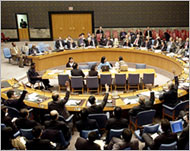Nobel laureate backs Africa UN bid
Kenyan Nobel laureate Wangari Maathai has added her voice in support of Africa’s effort to gain veto-wielding permanent seats on the UN Security Council, saying the world’s poorest continent and Asia had been neglected for too long.

Speaking on Wednesday in Johannesburg, where she delivered the third annual Nelson Mandela Lecture in honour of the statesman’s 87th birthday, Maathai said the UN body needed to become “more representative, making decisions in a more inclusive way”.
“It’s not quite fair really to say that the five nations who were there in 1945 are the ones who continue to say ‘who lives and who dies’, so to say,” the 65-year-old environmental activist told reporters.
“So I think it is very fair for the world to be renegotiating the distribution of power,” she said, adding: “I am in favour of regions that were left out for historical reasons… You need representation from this region (Africa), you need representation from Asia.”
African countries on Monday introduced a draft resolution in the UN General Assembly on behalf of the 53-member African Union (AU) calling for a 26-member Security Council, with six new permanent seats with veto power, including two for Africa, and five non-permanent seats, including two for Africa.
Correcting injustice
 |
|
The AU calls for six new Security |
Ambassadors from Egypt, Algeria, South Africa and Burkina Faso highlighted the need to correct an injustice that has left Africa as the only continent without a permanent member of the Security Council since the United Nations was created 60 years ago.
The draft was based on conclusions reached at the AU summit in Libya this month.
Egypt and Algeria warned that Africa was insisting on securing veto-wielding council seats, a demand certain to face rejection by the council’s ‘Big Five’.
Britain, China, France, Russia and the United States are the only permanent and veto-wielding members of the council, which also has 10 rotating non-permanent members without veto power.
Land issue
|
“Leaders felt the need to hold on to power when they felt threatened” Wangari Maathai, |
Asked about the crisis in Zimbabwe, where President Robert Mugabe’s government has attracted flak for its controversial seizure of white-owned farms for redistribution to landless blacks, Maathai said although she “did not have all the data” she felt that leaders “felt the need to hold on to power when they felt threatened.”
Without referring to Mugabe by name, Maathai said “it is very easy for leaders to use whatever issues they think will resonate with the people,” adding: “The land issue is a very captive issue in Africa, even in Kenya.”
“I think it is unfortunate that if leaders feel they have to stay in power and they use that (land) as the issue to rally people around.
“In Zimbabwe and many other countries you really need a very sober and secure leadership to deal with the issue without using power to victimise those who are perceived to be in a weak position,” she said.